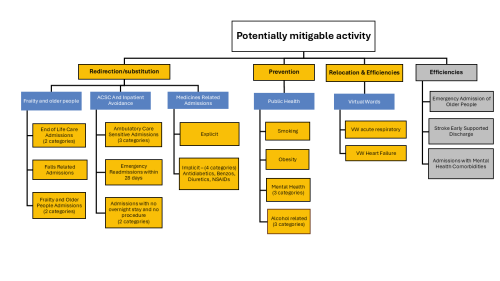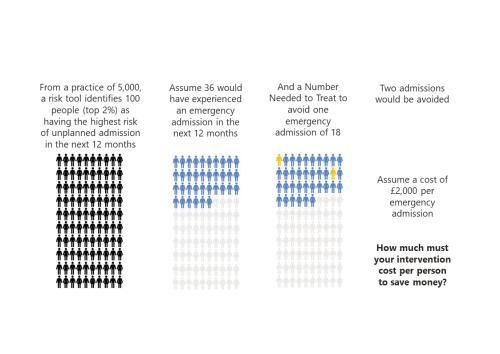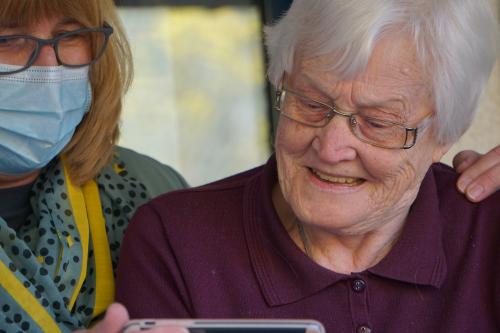
10-Year Productivity Forecast for the English NHS: An Expert Elicitation Study
Expert elicitation exercise commissioned by and in collaboration with the Health Foundation has produced forecasts of NHS productivity rates over the next 10 years.

A fairer funding future for general practice: lessons from Leicester, Leicestershire and Rutland ICB
Our evaluation of the Health Equity Payment (HEP) scheme in Leicester, Leicestershire and Rutland highlights how flexible, needs-based GP funding can support more equitable care.

Heart Failure Targeted Funding Programme 2023/24 Evaluation
The Heart Failure Targeted Funding Programme was an NHS England initiative to improve access to heart failure specialists in the community and during a hospital admission. Over £4.4 million was invested in services nationally. This report is an evaluation of the programme. The 2023/24 Heart Failure…

Shifting care ‘from hospital to community’: where to start?
What are the opportunities to shift activity from hospital to community? Our analysis provides an evidence-based place to start.

A missing element in ‘shifting care’
Our Director, Peter Spilsbury, outlines the scale of the task when it comes to making ‘the shift from hospital to community’.

Hydration, UTIs and older people: learning from NHS pilots about how to improve care
Our evaluation of hydration-focused interventions for older people found promising signs of impact and highlighted the practical and systemic challenges of delivering and sustaining change.

Mending smarter, not harder: Changing fracture care for children
The report demonstrates there is significant variation between trusts in England in how paediatric fractures are managed. Widespread adoption of less interventional approaches to paediatric fracture management could result in significant savings in hospital activity, particularly reduced follow-up…

Scoping a Health Needs Assessment for Adults on Probation in England
This scoping report explores the health inequalities experienced by people on probation and the limited data on their health needs and engagement with health services. It sets out recommendations for commissioning and delivering a national health needs assessment to address that data gap and…

Are there any non-technical ‘rules of thumb’ for assessing the quality of analysis?
The report below is from a short project that explored a simple set of questions: Are there ways of spotting poor analysis that don’t rely upon technical knowledge? Are there ‘rules of thumb’ that could orient decision makers – who typically don’t have analytical expertise - when thinking…

“Champion, challenge, collaborate.”
Being commissioned by the Mayor of London to produce independent reviews of proposals for major service change, affecting Londoners, perfectly aligns with our commitment to help the health and care system make better decisions and ultimately achieve benefits for population health and wellbeing.…
A Guide to Effective Evaluation: Design, Principles and Practice
Evaluation is key to making better decisions in health and care– understanding what works, for whom, and why. But good decisions require robust evidence, and robust evidence starts with effective evaluations. These help us decide what to do next, what to invest in, what to improve. This…

SU Insights
‘SU Insights’ is a series of events hosted by the Strategy Unit, exploring the latest analytical insights with leading experts.
 Better use of analysis | Elective care | Policy
Better use of analysis | Elective care | Policy
‘To risk stratify or not risk stratify, that is the question’ (At least, it should be)
Risk stratification tools are ubiquitous in healthcare. The concept is simple and seductive. By predicting the risk of future adverse events, we should be able to target efforts to avoid/mitigate them. Doing so would save both money and misery. But, as Niels Bohr said wryly, “Prediction isn’…

‘NHS 10 Year Plan’: Strategy Unit consultation response
The Strategy Unit’s response to the Government’s current consultation on the ‘10 Year Health Plan’ for England.

What are the downsides of digital?
What are the downsides of digital?

Midlands Analyst Network and Huddles
The Midlands Analyst Network was created to provide a space for analysts to share information, ideas and resources, as well as seek advice and guidance from one another.

How Does Access to Community Health Services for Older People Vary Across the Midlands?
Community health services provide invaluable support for older people with a range of health care needs. These services also keep local health systems working efficiently.

Contracting for health outcomes: from concept through theory to implementation
In this new report, jointly authored with colleagues from the University of York and The Royal Orthopaedic Hospital NHS Foundation Trust, we set out in detail how an outcomes-based contract for elective knee replacements might be constructed, and the potential implications for commissioners,…

MDSN: Community Healthcare Services
How Does Access to Community Health Services Vary Across the Midlands? Community health services provide invaluable support for older people with a range of health care needs. These services also keep local health systems working efficiently.Despite this importance, comparatively little is known…
Insight to action blog #3: It's a community effort
There are many challenges in translating the findings from insights into action. These may include poor access to evidence, poorly contextualised insights, low levels of capacity and capability to act upon findings, a lack of supportive structures and processes, variance in the perception of the…